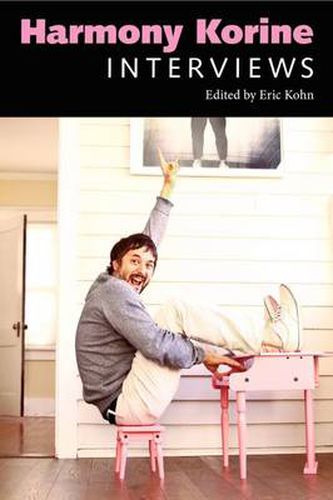Readings Newsletter
Become a Readings Member to make your shopping experience even easier.
Sign in or sign up for free!
You’re not far away from qualifying for FREE standard shipping within Australia
You’ve qualified for FREE standard shipping within Australia
The cart is loading…






This title is printed to order. This book may have been self-published. If so, we cannot guarantee the quality of the content. In the main most books will have gone through the editing process however some may not. We therefore suggest that you be aware of this before ordering this book. If in doubt check either the author or publisher’s details as we are unable to accept any returns unless they are faulty. Please contact us if you have any questions.
Harmony Korine: Interviews tracks filmmaker Korine’s stunning rise, fall, and rise again through his own evolving voice. Bringing together interviews collected from over two decades, this unique chronicle includes rare interviews unavailable in print for years and an extensive, new conversation recorded at the filmmaker’s home in Nashville.
After more than twenty years, Harmony Korine (b. 1973) remains one of the most prominent and yet subversive filmmakers in America. Ever since his entry into the independent film scene as the irrepressible prodigy who wrote the screenplay for Larry Clark’s Kids in 1992, Korine has retained his stature as the ultimate cinematic provocateur. He both intelligently observes modern social milieus and simultaneously thumbs his nose at them. Now approaching middle age, and more influential than ever, Korine remains intentionally sensationalistic and ceaselessly creative.
He parlayed the success of Kids into directing the dreamy portrait of neglect Gummo two years later. With his audacious 1999 digital video drama Julien Donkey-Boy, Korine continued to demonstrate a penchant for fusing experimental, subversive interests with lyrical narrative techniques. Surviving an early career burnout, he resurfaced with a trifecta of insightful works that built on his earlier aesthetic leanings: a surprisingly delicate rumination on identity (Mister Lonely, 2007), a gritty quasi-diary film (Trash Humpers, 2009) and a blistering portrait of American hedonism (Spring Breakers, 2013), which yielded significant commercial success. Throughout his career he has also continued as a mixed-media artist whose fields included music videos, paintings, photography, publishing, songwriting, and performance art.
$9.00 standard shipping within Australia
FREE standard shipping within Australia for orders over $100.00
Express & International shipping calculated at checkout
This title is printed to order. This book may have been self-published. If so, we cannot guarantee the quality of the content. In the main most books will have gone through the editing process however some may not. We therefore suggest that you be aware of this before ordering this book. If in doubt check either the author or publisher’s details as we are unable to accept any returns unless they are faulty. Please contact us if you have any questions.
Harmony Korine: Interviews tracks filmmaker Korine’s stunning rise, fall, and rise again through his own evolving voice. Bringing together interviews collected from over two decades, this unique chronicle includes rare interviews unavailable in print for years and an extensive, new conversation recorded at the filmmaker’s home in Nashville.
After more than twenty years, Harmony Korine (b. 1973) remains one of the most prominent and yet subversive filmmakers in America. Ever since his entry into the independent film scene as the irrepressible prodigy who wrote the screenplay for Larry Clark’s Kids in 1992, Korine has retained his stature as the ultimate cinematic provocateur. He both intelligently observes modern social milieus and simultaneously thumbs his nose at them. Now approaching middle age, and more influential than ever, Korine remains intentionally sensationalistic and ceaselessly creative.
He parlayed the success of Kids into directing the dreamy portrait of neglect Gummo two years later. With his audacious 1999 digital video drama Julien Donkey-Boy, Korine continued to demonstrate a penchant for fusing experimental, subversive interests with lyrical narrative techniques. Surviving an early career burnout, he resurfaced with a trifecta of insightful works that built on his earlier aesthetic leanings: a surprisingly delicate rumination on identity (Mister Lonely, 2007), a gritty quasi-diary film (Trash Humpers, 2009) and a blistering portrait of American hedonism (Spring Breakers, 2013), which yielded significant commercial success. Throughout his career he has also continued as a mixed-media artist whose fields included music videos, paintings, photography, publishing, songwriting, and performance art.